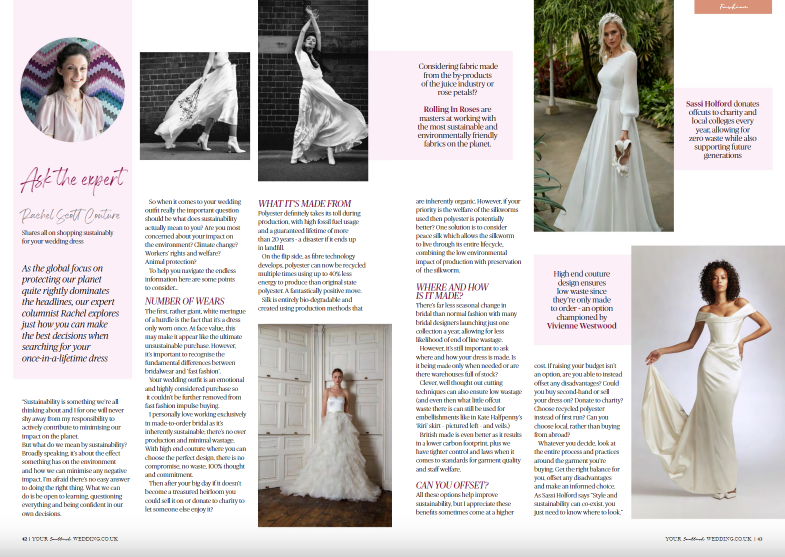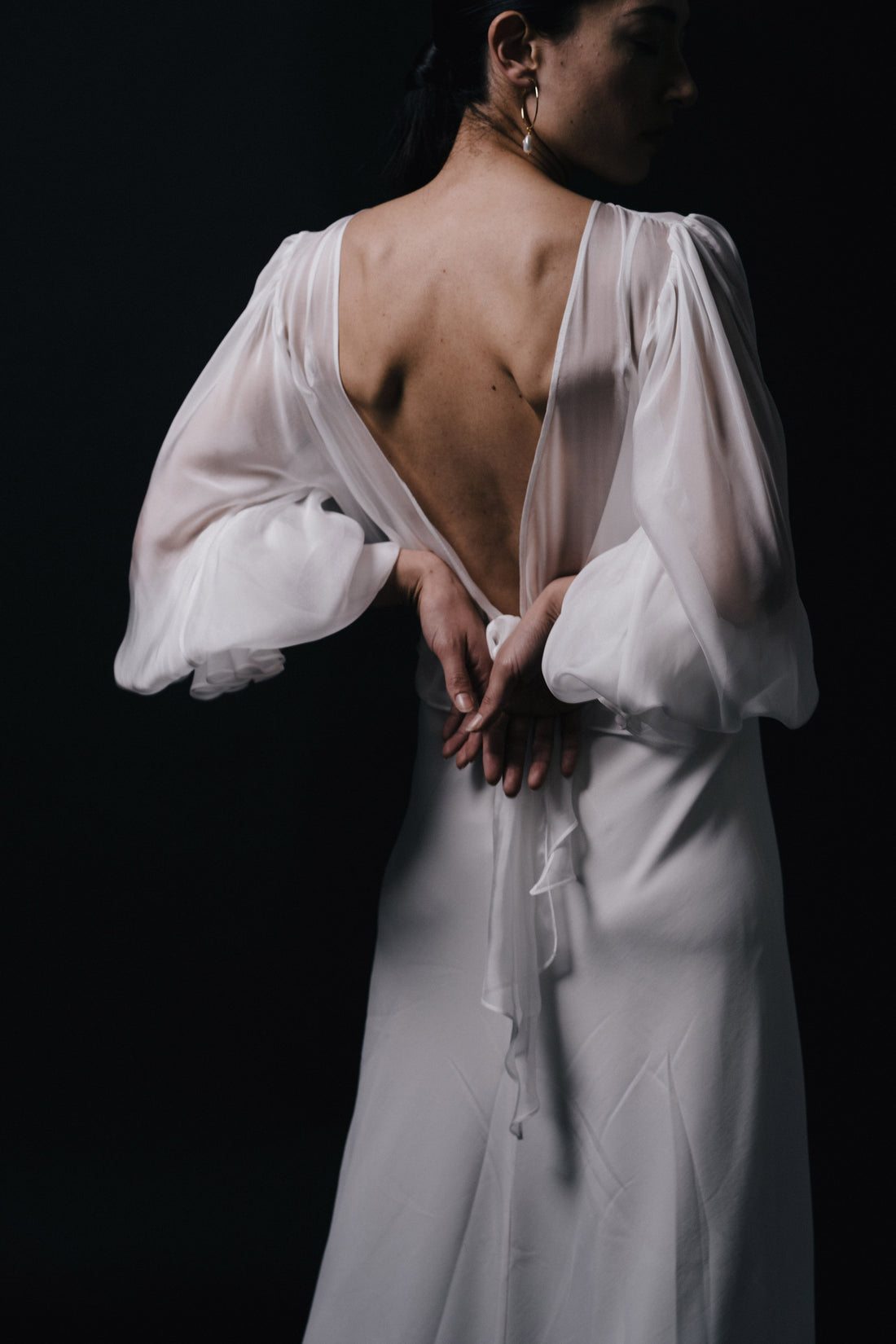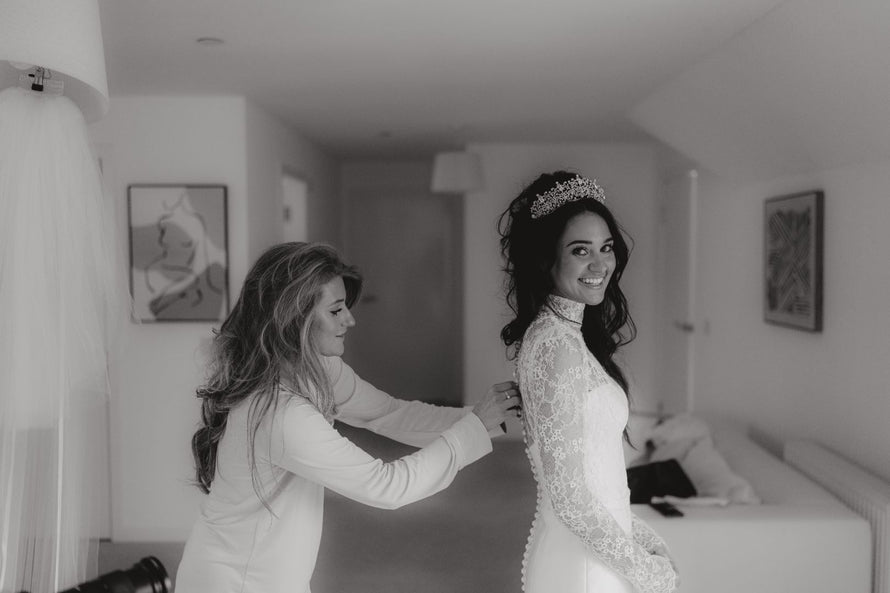'Ask The Expert'
by Rachel Snedden for Your Scottish Wedding

As the global focus on protecting our planet quite rightly dominates the headlines, our expert columnist Rachel explores just how you can make the best decisions when searching for your once-in-a-lifetime dress.
“Sustainability is something we’re all thinking about and I for one will never shy away from my responsibility to actively contribute to minimising our impact on the planet. But what do we mean by sustainability? Broadly speaking, it’s about the effect something has on the environment and how we can minimise any negative impact. I’m afraid there’s no easy answer to doing the right thing. What we can do is be open to learning, questioning everything and being confident in our own decisions.
So when it comes to your wedding outfit really the important question should be what does sustainability actually mean to you? Are you most concerned about your impact on the environment? Climate change? Workers’ rights and welfare? Animal protection?
To help you navigate the endless information here are some points to consider
NUMBER OF WEARS
The first, rather giant, white meringue of a hurdle is the fact that it’s a dress only worn once. At face value, this may make it appear like the ultimate unsustainable purchase. However, it’s important to recognise the fundamental differences between bridalwear and ‘fast fashion’.
Your wedding outfit is an emotional and highly considered purchase so it couldn’t be further removed from fast fashion impulse buying.
High end couture design ensures low waste since they’re only made to order - an option championed by Vivienne Westwood
I personally love working exclusively in made-to-order bridal as it’s inherently sustainable; there’s no over production and minimal wastage. With high end couture where you can choose the perfect design, there is no compromise, no waste, 100% thought and commitment.
Then after your big day if it doesn’t become a treasured heirloom you could sell it on or donate to charity to let someone else enjoy it?
WHAT IT’S MADE FROM?
Polyester definitely takes its toll during production, with high fossil fuel usage and a guaranteed lifetime of more than 20 years - a disaster if it ends up in landfill.
On the flip side, as fibre technology develops, polyester can now be recycled multiple times using up to 40% less energy to produce than original state polyester. A fantastically positive move.
Considering fabric made from the by-products of the juice industry or rose petals!? Rolling In Roses are masters at working with the most sustainable and environmentally friendly fabrics on the planet.
Silk is entirely bio-degradable and created using production methods that are inherently organic. However, if your priority is the welfare of the silkworms used then polyester is potentially better? One solution is to consider peace silk which allows the silkworm to live through its entire lifecycle, combining the low environmental impact of production with preservation of the silkworm.
WHERE AND HOW IS IT MADE?
There’s far less seasonal change in bridal than normal fashion with many bridal designers launching just one collection a year, allowing for less likelihood of end of line wastage.
However, it’s still important to ask where and how your dress is made. Is it being made only when needed or are there warehouses full of stock?
Clever, well thought out cutting techniques can also ensure low wastage (and even then what little offcut waste there is can still be used for embellishments like in Kate Halfpenny’s ‘Riri’ skirt – pictured left – and veils.)
British made is even better as it results in a lower carbon footprint, plus we have tighter control and laws when it comes to standards for garment quality and staff welfare.
Sassi Holford donates offcuts to charity and local colleges every year, allowing for zero waste while also supporting future generations.
CAN YOU OFFSET?
All these options help improve sustainability, but I appreciate these benefits sometimes come at a higher cost. If raising your budget isn’t an option, are you able to instead offset any disadvantages? Could you buy second-hand or sell your dress on? Donate to charity? Choose recycled polyester instead of first run? Can you choose local, rather than buying from abroad?
Whatever you decide, look at the entire process and practices around the garment you’re buying. Get the right balance for you, offset any disadvantages and make an informed choice. As Sassi Holford says “Style and sustainability can co-exist, you just need to know where to look.”



